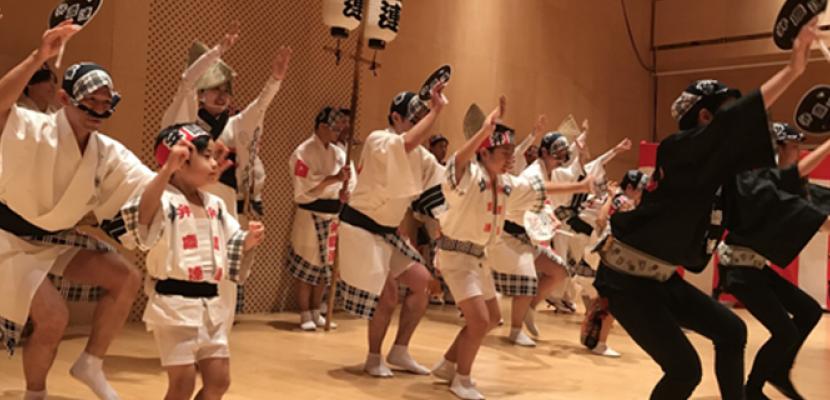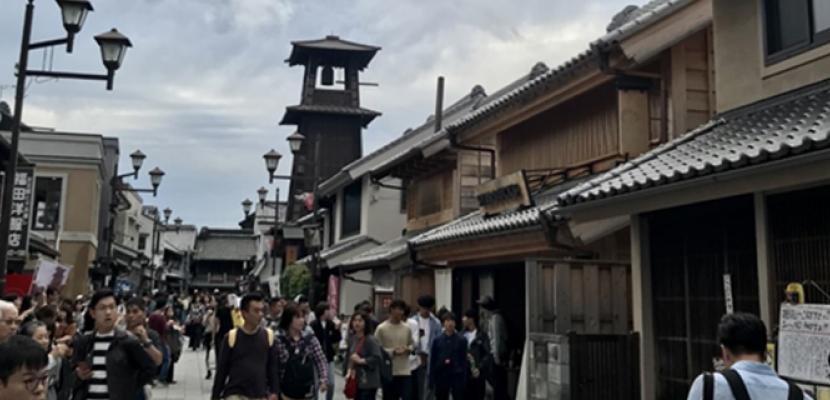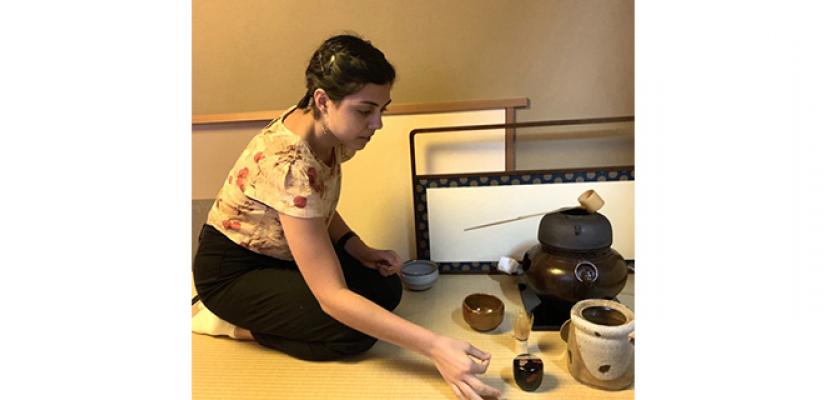
Bachelor of International Relations/Bachelor of Laws (CRICOS 093916G) student Crystal Paris shares some personal observations from her exchange to Hosei University in Japan.
Before I touched down in Tokyo for the first time in mid-September of this year, I thought I knew Japan. From quite a young age, I’ve had a fondness for the Japanese language and culture. But what I have previously learnt barely scratched the surface of all that the country offers. Undertaking an exchange in Japan was an opportunity for me to immerse myself completely. I’m now a little over halfway through my semester abroad and the time I have spent here so far has been nothing short of incredible. To consolidate my thoughts and experiences so far – here’s my guide of things to know before jetting off to the Land of the Rising Sun.

1. Learn and use as much Japanese as possible
Rest assured, it is possible to get by in Japan without speaking a word of the (Japanese) lingo. For example, all my classes at Hosei are taught in English and signage throughout Tokyo is bilingual. Despite this, I would definitely encourage you to practise even some basic conversational words and phrases. Few people in Japan can confidently and comfortably speak English. The lack of conversational English in Japan – especially in suburbia – was something that I was personally not expecting, and in hindsight was perhaps a rather naïve presumption to have made. Being surrounded by a language I barely understood made everyday life quite difficult in the beginning. I have persevered with time (as well as some language study) and communicating has gradually become easier and more enjoyable, and my confidence in doing so has also increased.
2. Get used to public transport
Whilst at first glance the Japanese subway system appears very confusing and complex, believe me when I say that is incredibly efficient and well-organised. Purchasing a prepaid commuter card (Suica/Pasmo) is a convenient way to ride on the trains and as a student you are granted a discounted fair for the personalised route you travel from your accommodation to university. The commute during rush hour is infamous for packing people into trains like sardines – as I can attest to firsthand. Whilst this is an unavoidable experience for most students given class hours, there are a few ways to make the transit a little more eased. The first is to keep your backpack in front of (and close by) you and the second is to be polite but firm when trying to get off the train – a slight nudge accompanied with a polite “sumimasen” (excuse me) is the most common way to go about exiting a packed carriage.

3. Manners, manners, manners
The Japanese are very polite, and proper etiquette is considered very important. Some common manners and customs in Japan include bowing, which is used by Japanese people when greeting one another but can also be used to thank, apologise or ask a favour of someone and removing (outdoor) footwear, before entering Japanese homes and even some restaurants. There is also certain conversational etiquette which you will become accustomed to after a while.
4. Easy day trips
Whilst Tokyo itself definitely has a lot to offer, there are many places beyond the metropolis that are worth exploring. Taking off on day trips from Tokyo is a great way to discover more of the country’s history and nature. Places like Kamakura, Kawagoe, Nikko, Yokohama, Fujinomiya are between 50 minutes to two and a half hours by train from Tokyo Station, and boast beautiful beaches, scenic hikes and landmark features. I have visited two of the five listed cities and intend to have travelled to all by my return home.
5. University life
It is rare to find a university campus in Japan that is, by definition, “flat.” In Tokyo, almost all major universities have vertical campuses, Hosei included. Boissonade Tower is the 10th tallest educational building in the world, with 26 floors.
I am taking seven classes whilst abroad: six international relations equivalent subjects and one Japanese Language class. This is standard enrolment for a student at Hosei and class attendance is compulsory – if you miss more than four classes within the 14-week semester you automatically fail. Admittedly, the system here does take a little bit of getting used to. Despite this, I really enjoy the subjects within the exchange program being tailored toward learning about the country, which has allowed me to gain a more thorough knowledge of the culture and language that belongs to Japan.

6. Accommodation
Dorms in Japan vary greatly from what would be typical in Australia. Here, dormitories are privately owned and so are not affiliated with the particular university that you are studying at. You contract with them individually; however, I did not experience any difficulty with this process as Hosei was very helpful and even subsidised some of my living expenses! Dormitories are not on (or close to) campus and travel time and distance range from 30 minutes to an hour’s ride by train. The way the dorms are run makes them feel very “homey”. Mine is run by a dorm manager and his wife (who are both so lovely). We are served two meals a day and we also have curfew we must abide by. I am really enjoying my experience in the dorm – as I get to live with a bunch of really awesome girls, much like a family– but I have friends in other (more independent) living arrangements such as shared houses or apartments who are having a fantastic time too.
7. Konbini's (otherwise known as student's snack haven)
Japan is littered with convenience stores; you can’t go a block without seeing one. There are three main chains – 7-Eleven, Family Mart and Lawson – and I’m here to confirm that every amazing thing you’ve heard about them is true – cheap and handy. Most are open 24/7 and will have in supply nearly anything you need or desire – especially their food and drink items. Some staples include: pre-packaged meals (soba, udon), oden (fried tofu, fish cakes, boiled eggs), instant noodles, buns (both sweet and savoury), bento boxes, onigiri (rice balls with different fillings), canned coffee and tea as well as snacks such as lollies, chocolate, chips and ice-cream, which will often reflect seasonal changes.

8. Take note of special days and dates
Japan has a dedicated day for everything and a fair number of national holidays including “Coming of Age” day and the Emperor’s birthday. Celebration of these days usually does not mean that all shops are closed, and so you won’t struggle to find places that are open. The Japanese people also celebrate a variety of “matsuri” (festivals) during the year such as Setsubun (first day of spring) and Birth of the Buddha. November is the season for campus festivals in Japan – where each university showcases its clubs and societies. I attended Hosei’s earlier this month and enjoyed some live performances and delicious food. Taking part in traditional occasions is a great way to share and experience the religious and cultural customs of Japanese life.
9. Recycling madness
The Japanese make many distinctions between rubbish types and sorting systems vary between prefectures. Getting a grip on how to dispose of rubbish can be a little complicated, but fortunately, as a resident of Japan for the period of my exchange, I have developed my own guide on how to throw rubbish away. There are four main categories to separate – burnable, non-burnable, recyclable and oversized items. Whilst it might seem obvious enough, often certain items which you would expect to dispose of in one bin are actually meant to be disposed of in another. It might seem like a weird item to put on this list but trust me, you’ll thank me for it later!
10. Be open
There is such a variety of experiences in and around Tokyo city, and within the country at large. From the animal cafes in Harajuku, to the neon lights and skyscrapers of Shinjuku, to the centuries-old Shinto shrines displaced throughout the metropolis – there is truly no shortage of things to do, sights to see, or food to eat!
I really recommend making the most of being a student at Hosei and putting yourself out there to join clubs and meet new people. Many of the places I have travelled to and events and outings that I have taken part in have been from recommendation by Japanese friends as well as through programs run by Hosei – two of my personal highlights being Sado (traditional Japanese tea ceremony) and Awa-odori (traditional dance).
For anyone looking to study abroad, Japan truly has it all. I am grateful for the experiences I have had at Hosei and in Tokyo so far and look forward to what the next two months have in store for me!
Exchange at Bond
Exchange enables you to embark on a new adventure while gaining credit towards your Bond degree.